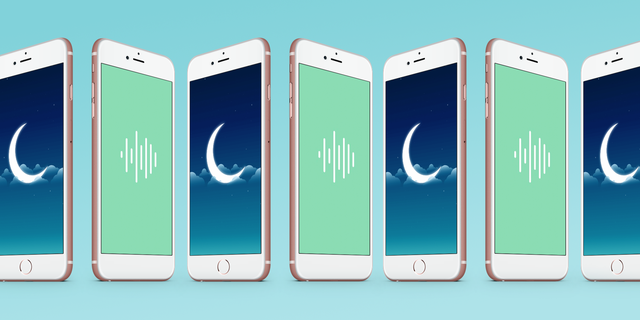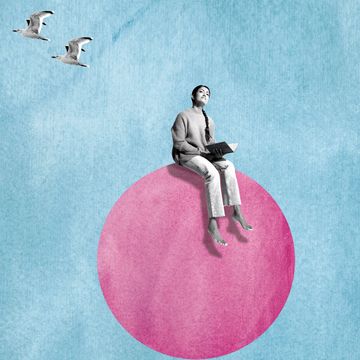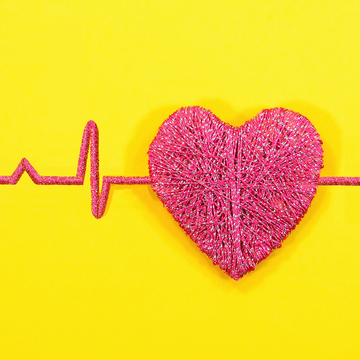11 Best Sleep Apps of 2024
You’ll be asleep in no time with the help of these apps for iPhones and Android.

Tossing and turning in your bed for hours on end can feel like a personal nightmare. As the clock keeps ticking, you can try all the usual tricks in the book (a glass of milk, a new mattress, eating foods that’ll help you sleep through the night or reading a book) or you can turn to an app on your phone.
"Meditating and reading can be great tools for many, but some people may prefer utilizing a sleep app that assists with the process," says wellness expert and Good Housekeeping Institute Nutrition Lab Deputy Director Stefani Sassos, M.S., R.D.N., C.S.O., C.D.N., NASM-CPT. Whether you want to track sleeping patterns, listen to white noise or follow guided meditations, the best sleep apps will help you go to sleep fast and fix your sleep schedule once and for all.
Along with recommendations from our own Media & Tech Lab experts at the Good Housekeeping Institute, we spoke with medical professionals and sourced feedback from real users to determine the best sleep apps to improve your quality of sleep and create a relaxing bedtime routine
You're not alone if you struggle to snooze: 14.5% of US adults had trouble falling asleep most days in a month, according to a study from the Center for Disease Control and Prevention (CDC). The best sleep apps for Androids and iPhones can help take you out of that percentage by lowering your stress levels, relaxing you at night time and drowning out external distractions. Read on to discover the best sleep apps to help you sleep through the night, every night.
Best Overall Sleep App: Sleep Cycle

If you want to learn more about how well you sleep, the Sleep Cycle app is for you. In addition to offering guided meditations and sleep coaching programs, it tracks your sleep patterns and provides tips to help you optimize your snooze time. Plus, it features an alarm clock function that gently wakes you up when you're in your lightest sleep phase, so you'll wake up feeling refreshed.
Just keep in mind that no sleep tracker is 100% accurate, so if you're really struggling with your sleep, you may need to see a dedicated sleep specialist. "Accuracy can be an issue here because [with an app], you don't have a sensor physically on the body — but it can still provide you with clues about your sleep," says Michael J. Breus, Ph.D., a clinical psychologist and fellow of the American Academy of Sleep Medicine.
Cost: Free to download the app and access limited content; $10/month or $40/year for full access
Pros:
- Records coughs, snoring, sleep talking and more to track your sleep patterns
- Provides advice and resources to improve your sleep quality
- An alarm clock is designed to wake you up when you’re in the lightest sleep phase
Cons:
- Some users report faulty results while sleeping with a partner in the same bedroom.
Best Sleep Tracking App: Oura

Slip on the Oura ring and drift off to dreamland. "This is one of the most accurate health trackers on the market, and it uses hardware so you benefit from having that sensor [on the body]," says Dr. Breus. Tiny sensors in the ring detect body signals via the highly sensitive arteries in your fingers, so you'll be able to track everything from your sleep activity to your heart rate and body temperature during the night.
If you wear it all day long (which is encouraged), you'll learn what's going on inside of you during daylight hours, too. But how does all of this data tracking help you sleep? Knowing your body and its trends can help you target the areas you need to work on, like getting more exercise or spending more time engaging in mindfulness practices, which will eventually help you snooze better.
Cost: Free to download the app; from $299 for the ring
Pros:
- Tracks sleep activity, heart rate, body temperature, menstrual cycle phases, daily activity and more
- Provides an Oura Sleep Score (1-100) every night based on body signals and time spent in each sleeping stage
- The app shares personalized advice on how to improve your sleep quality.
Cons:
- Must wear the Oura ring all day and night long
Best Sleep App for Meditation: Headspace

Headspace is known as a popular guided meditation app, but it's also great for sleep. We particularly enjoy its "sleepcasts," which are 45- to 55-minute-long audio experiences (kind of like adult bedtime stories) that help you visualize calming experiences, like a slow moving train or a walk through a garden. Headspace offers new stories every night, so you'll never get bored.
If you upgrade to the paid version of this app, you'll gain access to more than 40 themed meditation courses (like ones designed specifically for sleep and stress), plus lots more sleepcast and music options to help you wind down at the end of the day.
Cost: Free to download the app and access limited content; $13/month or $70/year for full access
Free trial period: 14 days with a yearly subscription
Pros:
- Free download includes access to limited content
- Easy to use with guided sessions for beginners
- Meditation courses for specific situations to lower stress levels for better sleep
Cons:
- Less sleep-specific stories available compared to Calm’s library
Best Sleep App for White Noise: Noisli

This super simple app lets you choose from a bunch of different sleep sounds (like thunder, wind, white noise and even the buzz of a coffee shop) so that you can create your ideal sleep soundtrack. You can even combine sounds you love and save them in the app for future use. Pro tip: If you're using Noisli overnight, keep your phone plugged in — otherwise, you may wake up to a drained battery.
Cost: $2, but the sounds on the Noisli website are free
Pros:
- Multiple noise options from white noise, brown noise, rain storms, ocean waves and more
- Relaxing sounds drowns out external noises to help you sleep through the night
- Save your favorite sounds in the app to find them again easily
Cons:
- Must charge phone all night to prevent draining battery
Best Sleep App With Meditation Device: Core

We love how easy it is to use Hyperice's Core app and accompanying meditation training device. To get started, all you have to do is pick up the small handheld sphere while the app on your phone guides you through a soothing meditation session, whether it’s for sleep, anxiety or stress. Especially if you’re someone who has a hard time meditating, our experts found that this is a great tool to help center your attention and breathing before drifting off, by focusing on Core’s gentle vibrations.
Our testers liked the Core device’s natural wood design, which not only looks beautiful on a nightstand but contains ECG biosensors that measure and track your progress in the app. We also found that the Bluetooth connectivity between the Core and our mobile devices was seamless, and that the device's charge lasted for days.
Cost: Premium bundle includes Core device (typically $179) and app subscription (typically $70/year) for $200
Pros:
- Core tool centers your attention to make meditation easier
- ECG Biosensors measures your heart and nervous system to assess mental and physical wellness
- Core device has a sleek wooden design
Cons:
- Pricey
Best Sleep App With Alarm: Pzizz

With Pzizz, you can set a timer for the length of your sleep session so it plays a soothing "dreamscape" (read: combo of music, voiceovers and sound effects) while you snooze; then, you can wake up to the app's built-in alarm. This way, the dreamscape will not drown out your alarm causing you to accidentally sleep through it. You'll need to upgrade to access the more advanced features, like the ability to choose different sounds.
Cost: Free to download the app and access limited content; $8/month or $50/year for full access
Free trial period: 7 days
Pros:
- Combines psychoacoustic principles for the perfect sleeping soundtrack
- Custom timer sets an alarm to wake you up and stop playing sounds
- Over time the app will personalize sounds based on your likes and dislikes
- Up to 24 hours of noise at a time
Cons:
- There is a charge for the ability to choose a different sound
Best Sleep App for Falling Asleep Fast: Slumber

Slumber offers a combination of experiences to help you fall asleep quickly, whether it's meditation sessions, a six-part bedtime story series or the gentle sound of a warm jacuzzi. You can also choose a background noise (like rain or the ocean) to play for up to 10 hours after the main track ends. New sleep-inducing stories and meditations are added each week, and you can listen to them all if you upgrade to Slumber's premium version (otherwise, you can access select episodes for free).
Cost: Free to download the app and access 10+ episodes; $8/month or $60/year for full access
Pros:
- Six-part bedtime story series to help you fall asleep quickly
- Free access to 10+ episodes
- Background noise can kick in after the main track (Story or meditation session) ends
Cons:
- No sleep tracking metrics
Best Sleep App for Bedtime Stories: Calm

We love that the Calm app is super easy to use, and that its Sleep Stories section has bedtime stories (for kids and adults!) read aloud by people with soothing voices, including celebrities like Matthew McConaughey. Only a few stories are included for free, but getting a subscription unlocks a large library of meditations made specifically for sleep, plus categories like stress and ASMR, with new content each week. Calm also offers relaxing music, breathing and stretching exercises.
Cost: Free to download the app and access limited content; $70/year for full access
Free trial period: 7 days
Pros:
- Extensive library of stories to listen to a new one every night
- Hear bedtime stories from celebs like Matthew McConaughey, Harry Styles, Camila Cabello and more
- Breathing and stretching exercises helps you to relax
Cons:
- Guided meditations and layout can be complex for beginners
Best Sleep App for Relaxation: Ten Percent Happier

Ten Percent Happier is an app that can help you with more than just getting better sleep. Based on ABC anchor Dan Harris's best-selling book and podcast of the same name, the app offers a wide variety of meditation courses — including ones for sleep — that range from three minutes to 45 minutes to help you relax. There is also the option to message a coach for extra support.
Cost: Free to download the app and access limited content; $100/year for full access
Free trial period: 7 days
Pros:
- Variety of short and long meditation sessions
- Can message a coach with questions or concerns
- Includes sleep-specific meditation courses
Cons:
- No monthly option to try before committing to a yearly subscription
Best Sleep App for Journaling: Reflectly

Establishing a nightly routine can help you ease your mind before sleeping. Try journaling at the end of the day, which has been proven to have many mental health benefits and can help you feel relaxed when you get into bed. As it turns out, you don't even need a physical journal to do this, thanks to Reflectly. This app functions as an "intelligent" journal that asks you guided questions and prompts you to organize your thoughts. It helps you, well, reflect on the day, on your thoughts and any problems you may have faced. You may find yourself moving past thoughts that would have kept you up all night otherwise.
Cost: $10/month or $60/year
Free trial period: 7 days
Pros:
- AI guided journal to help you sort through thoughts and emotions
- Journaling can be a stress-reducing addition to your nightly routine
- Habit and mood trackers to see your progress over time and how that affects your mood
Cons:
- No sleep-specific trackers or prompts
Best Sleep App for Kids: Moshi

Moshi offers designed to help them fall asleep faster. Most of the stories, which feature adorable animated illustrations and the voices of celebrities like Goldie Hawn, last between 15 and 20 minutes to engage kids while they get ready for sleep. You can even download them for instances where Wi-Fi may not be available (e.g., traveling on planes).
Cost: Free to download the app and access limited content; $60/year for full access
Free trial period: 7 days
Pros:
- Short, kid-friendly bedtime stories that are downloadable
- Guided meditations and breathing exercises for kids to relax
- Kid-friendly games like coloring and puzzles for the day time
Cons:
- Some reviewers say bedtime stories aren’t as suitable for older kids (10+)
How we chose the best sleep apps

To determine the best sleep apps, our editors consulted Good Housekeeping Institute technology experts that have experience testing and analyzing iPhone and Android apps like the best apps for kids. Picks that were not chosen by GH analysts were recommended by medical doctors and sleep experts. We also sifted through positive (and negative) online reviews and consumer feedback to find the best sleep apps available. When evaluating and choosing the best apps, we consider factors like ease of use, cost, unique features and range of content.
What to look for in the best sleep apps

✔️ Consider your top priorities: Before you pay for a subscription, compare the features of each sleep app to determine what will suit your needs best. If you live in a noisy neighborhood and want to prevent sounds from waking you up, an app like Noisili featuring white noise and other soundtracks can help. If you find your mind racing before bed, journaling out your thoughts in an app like Reflectly can relax you. If you tend to wake up from snoring or sleep talking, tracking your sleep with an app like Oura may be the best fit for you.
✔️ Check the price: Some apps are on the pricier side due to their advanced tracking features or extensive content. Most apps have a free trial option or a monthly subscription to allow users to test it out before committing to a yearly subscription, but you can also always start with the free or inexpensive options and see if you have any improvement in your sleep quality.
✔️ Consumer reviews: When in doubt, scroll through the reviews and social media comments to see how other users are enjoying (or not enjoying) the app. Plus, you can take note of how the customer service team responds to complaints and helps users with an issue.
✔️ Ease of use: Some apps have a simpler design and layout with meditation courses like Headspace, while others offer more complex mindfulness techniques for those who are more experienced like Calm.
What is a sleep app?

If you've ever had trouble shutting down your mind right before bed, a sleep app can be a useful tool to help you relax and fall asleep faster. "Sleep is essential to every bodily process and affects everything from our immunity and metabolism to chronic disease risk and mental health," says Sassos. "The amount of hours you sleep at night is important, but also the quality of that sleep is significant too."
Sleep apps range from ones that actually track your sleep to options that provide white noise, offer guided meditations and more. When it comes to sleep apps, you’ll want to pinpoint where your sleep needs intervention. Do you have trouble falling asleep or staying asleep? Do you battle with a racing mind the second your head hits the pillow? Figuring out what aspects of your sleep need assistance can help you select the best sleep app for you.
There is one caveat when it comes to sleep apps, though: If you're opting for a health tracker app that provides insights into your sleep patterns, like how much time you spent in REM cycle, try not to obsess about the data because that can turn into a whole new snooze-time problem.
"If, in the morning, your app says you slept only 65% of the night, you could become anxious and develop psychophysiological insomnia, which means you start to turn to bad habits like alcohol or medication to try to get what your app says is sufficient sleep,” says Raj Dasgupta, M.D., a sleep expert and associate professor of clinical medicine at Keck School of Medicine of USC.
Why trust Good Housekeeping?

This story was most recently updated and vetted by Rachel Rothman and Olivia Lipski, who specialize in testing and reviewing tech and fitness gear for GH, among other categories. In addition to ensuring all information about our top sleep app picks was up to date, Olivia also interviewed Stefani Sassos, the deputy director of the Good Housekeeping Institute's Nutrition Lab, who studied the intersection of sleep and health while completing her master's in clinical nutrition at New York University and her B.S. in nutritional sciences from Pennsylvania State University.
This story also features additional reporting by GH health editors Alyssa Jung and Zee Krstic. In 2020, Zee coordinated a full review of the top-rated sleep apps and services on the market for this article. Meanwhile, Alyssa interviewed several sleep experts for their insights; throughout her journalism career, she has worked with some of the world's leading somnologists and other licensed sleep specialists.

Readers Also Read

Inspirational Quotes to Start Your Day

Your Guide to the Mediterranean Diet

Should You Be Trying Moringa?

Recall Expands to Include More Skin Care Products







